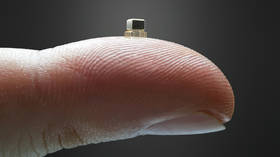Russians overwhelmingly oppose microchipping of humans, fear becoming cyborgs without even knowing it – state-backed poll

The majority of Russians are opposed to implanting microchips into the human body – a popular idea in sci-fi movies, yet rare in reality – a recent survey has discovered.
While a whopping 77 percent of those surveyed by the Russian Public Opinion Research Center VCIOM (a state-linked outfit) said they are against the idea in principle, 45 percent elaborated that they were afraid of being implanted without even knowing it.
Other hyper-anxious citizens stressed that their fears were based on the presumption that microchips could be hazardous for their health or be used for 24-hour surveillance.
Only 11 percent of respondents said that they either were not as concerned or had other things to worry about. Nevertheless, they didn't expect technology that could render people cyborgs to appear any time soon – at least not during their lifetime. Twenty-three percent had never heard about such technology before the sociologists enlightened them.
Also on rt.com Gates dismisses ‘bizarre’ Covid-19 conspiracy theories as his impact on WHO, global health business increasesSome people, also a tiny minority, believe chipping would benefit them, making it easier to replace paper IDs and bank cards or help in the search for missing persons.
In 2019, a group of conservative activists adopted a resolution against “mandatory chipping” and “total electronic surveillance” which they assumed meant biometric passports and other tools of personal digital authorization.
In 1998, British man Kevin Warwick became the first living person in history to have a silicon chip implanted into his body. He used a microdevice in his arm as a remote control tool. The experiment lasted for nine days before the chip was removed.
Also on rt.com Russian cleric SEIZES CONTROL of convent after being censured for calling Covid-19 an excuse to ‘chip population’In 2006, American company CityWatcher implanted chips into the arms of its employees to use them as access keys to the company's data banks.
In 2015, a Swedish firm named Epicenter followed this example, its employees utilised the tech in opening doors, operating printers and buying from vending machines.
Currently, despite those controversial experiments, the technology is mostly used to locate pets and livestock, not people.
Like this story? Share it with a friend!













